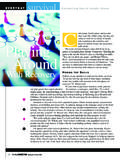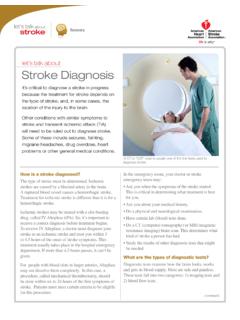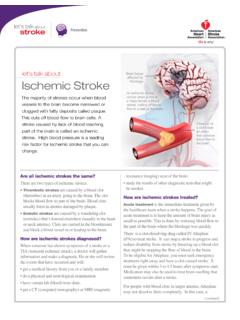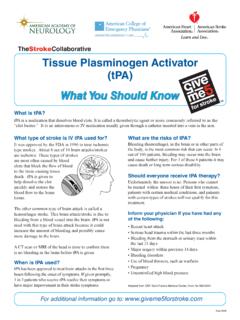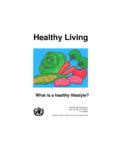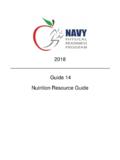Transcription of let’s talk about Lifestyle Changes To Prevent Stroke
1 Prevention(continued)let s talk aboutLifestyle Changes To Prevent StrokeHow can I make my Lifestyle healthier ?Here are steps to take to be healthier and reduce your risk of Stroke : Don t smoke and avoid second-hand smoke. Improve your eating habits. Eat foods low in saturated fat, trans fat, sodium and added sugars. Be physically active. Take your medicine as directed. Get your blood pressure checked regularly and work with your healthcare provider to manage it if it s high. Reach and maintain a healthy weight. Decrease your stress level. Seek emotional support when it s needed. Have regular medical do I stop smoking? The first and more important step is making a decision to quit and commit to stick to it.
2 Ask your healthcare provider for information, programs and medications that may help. Fight the urge to smoke by going to smoke-free facilities. Avoid staying around people who smoke. Keep busy doing things that make it hard to smoke, like working in the yard. Remind yourself that smoking causes many diseases, can harm others and is deadly. Ask your family and friends to support do I change my eating habits? Ask your doctor, nurse or a licensed nutritionist or registered dietician for help. Be aware of your special needs, especially if you have high blood pressure, high cholesterol or diabetes. Avoid foods like fatty meats, butter and cream, which are high in saturated fat.
3 Eat moderate amounts of food and cut down on saturated fat, trans fat, sugar and salt. Bake, broil, roast and boil foods instead of can do plenty to make your heart and blood vessels healthy, even if you ve had a Stroke . A healthy Lifestyle plays a big part in decreasing your risk for disability and death from Stroke and heart have many other fact sheets to help you make healthier choices to reduce your risk, manage disease or care for a loved one. Visit to learn more. Take a few minutes to write your questions for the next time you see your healthcare example:Call 1-888-4- Stroke (1-888-478-7653) to learn more about Stroke or find local support groups, or visit up to get Stroke Connection magazine, a free magazine for Stroke survivors and caregivers at with others sharing similar journeys with Stroke by joining our Support Network at HOW CAN I LEARN MORE?
4 Do you have questions for the doctor or nurse? 2015, American Heart AssociationWhat is the most important change I can make ?What kind of physical acti vit y can I do safely?My Que stions: Lifestyle Changes To Prevent Stroke Read nutrition labels on packaged meals. Many are very high in sodium. Limit alcohol to one drink a day for women; two drinks per day for men. Eat more fruit, vegetables, whole-grains, dried peas and beans, pasta, fish, poultry and lean about physical activity? If you have a chronic medical condition, check with your doctor before you start. Start slowly and build up to at least 150 minutes of moderate physical activity (such as brisk walking) a week.
5 Or, you can do 75 minutes of vigorous-intensity physical activity, or a combination of the two, to improve overall cardiovascular health. Look for even small chances to be more active. Take the stairs instead of an elevator and park farther from your you have a chronic medical condition, check with your doctor before starting an exercise program.


